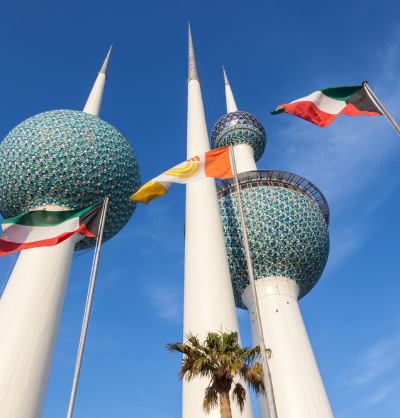Kuwait Implements an Amnesty for Illegal Migrants
By Piercamillo Falasca
Kuwait launched an important initiative to address the issue of illegal migrants that aims to benefit some 110,000 expatriates. The Interior Ministry announced a three-month amnesty period starting 17 March 2024 and extending until 17 June, providing a window of opportunity for individuals to align with legal frameworks without the threat of prosecution.
During this amnesty, people who overstayed or violated residency regulations have the opportunity to rectify their status. They can either legalise their stay by obtaining a new residency visa after paying off their accrued fines (up to KD 600 for those who have been irregular for roughly 300 days or more) or choose to leave the country without penalty. Those who opt to leave Kuwait under this scheme can do so through any exit point without the need to pay fines though must complete new entry procedures for reentry. This provision offers a path for those seeking to return to Kuwait legally in the future. However, the amnesty comes with strict warnings—those who fail to either legalise their status or exit the country by the deadline will face deportation and will be barred from re-entering Kuwait and additional legal penalties may also be applied as per Kuwaiti law. This initiative reflects Kuwait’s efforts to manage its expatriate population, which includes tens of thousands of illegal residents.
Previously (2021) a similar amnesty occurred, indicating a sustained approach for addressing this issue. Critics of the policy consider the fine as too heavy for most irregular workers (KD 600 are about US$ 1950), whose status is often due to exploitative behaviours of employers. Nonetheless, the amnesty aims to streamline residency management and reflects Kuwait’s attempt to modernise its labour market.
GCC Celebrates Womens’ Achievements
By Daniela Palumbo
The Gulf Cooperation Council (GCC) recently organised a major International Women’s Day event in Riyadh (08 March), which shone a spotlight on the extraordinary achievements of Gulf women. The event provided a platform to celebrate the remarkable contributions of women from across the region with particular focus on the central role of female empowerment, a cornerstone of Saudi Arabia’s Vision 2030, and the country’s commitment to safeguarding women’s rights and eliminating discrimination.
A highlight of the event was the engaging panel discussion featuring distinguished women from different GCC countries including Noura Al-Neyadi (UAE), Lulwa Al-Awadhi (Bahrain), Jokha Alharthi (Oman) and Ghada Youssef Al-Ghanim (Kuwait) who enriched the dialogue with their diverse insights, experiences, and backgrounds that represent the magnitude of talent and potential in the Gulf states and underscores the invaluable contribution of women to their societies. In addition, each female speaker was honoured during the ceremony, receiving a trophy in recognition of her deep impact on local society and beyond.
The event encapsulated the collective commitment to foster an inclusive environment in which women can thrive and contribute meaningfully to the progress of society. The womens’ achievements reaffirm the GCC’s commitment to promoting gender equality and ensuring that every woman has the opportunity to reach her full potential.
Diplomatic Overdrive: GCC’s New Vision 2024 for Regional Security
By Daniela Palumbo
In this period full of geopolitical complexities and regional uncertainties, GCC countries are increasingly focusing on diplomacy as the keystone of their regional security visions. As tensions rise in the Middle East, the GCC countries are pursuing a concerted effort to prioritise dialogue, cooperation and diplomatic engagement to safeguard their collective interests and ensure stability in the region. Diplomacy is increasingly crucial in a landscape of multifaceted challenges, ranging from security threats to economic vulnerabilities.
Underlying the GCC’s diplomatic push is a recognition of the interconnectedness of security challenges and the imperative for collective action. Rather than resorting to unilateral approaches or militaristic positions, GCC states actively seek avenues for dialogue and consensus building. This shift toward diplomacy underscores a commitment to resolve conflicts through peaceful means, thus avoiding the escalation of tensions that could destabilise the entire region. In addition, GCC countries are using their diplomatic prowess to address a variety of issues, from traditional security problems such as terrorism and extremism to emerging threats such as cyber warfare and environmental degradation. Through engaging in diplomatic initiatives, including mediation efforts, confidence-building measures and diplomatic dialogue platforms, these nations are fostering an environment favourable to regional cooperation and conflict resolution.
Evidence of this is the promotion of the new Vision 2024 which lays its foundation on 15 pillars — grouped into 3 thematic groups: security, economy and climate change — on which the new GCC security policy will gain strength. The document will point steps to be taken to overcome differences and disagreements so that they can learn how to stand together on issues that affect the whole area, such as those concerning energy security.
The GCC focus on diplomacy goes beyond traditional joint-state interactions to include broader regional frameworks and multilateral platforms. In fact, the document includes the affirmation of greater alliances even and especially with actors outside the region, as in the case of the EU. The GCC’s approach to regional security underscores a strategic shift toward proactive and collaborative ties to addressing the myriad challenges of the Middle East.
Sources:
- https://www.arabnews.com/node/2473826/saudi-arabia
- https://gulfnews.com/uae/people/noura-al-neyadi-the-emirati-photographer-helping-communities-documenting-heroes-1.97440534
- https://www.google.com/search?q=Lulwa+Al-Awadhi&oq=Lulwa+Al-Awadhi&gs_lcrp=EgZjaHJvbWUyBggAEEUYOTIICAEQABgWGB4yCggCEAAYgAQYogQyCggDEAAYgAQYogQyCggEEAAYgAQYogQyCggFEAAYgAQYogTSAQc0NjBqMGo3qAIAsAIA&sourceid=chrome&ie=UTF-8
- https://www.google.com/search?q=jokha+alharthi&oq=Jokha+Alharthi&gs_lcrp=EgZjaHJvbWUqCggAEAAY4wIYgAQyCggAEAAY4wIYgAQyBwgBEC4YgAQyBwgCEC4YgAQyBwgDEAAYgAQyBwgEEAAYgAQyBwgFEAAYgAQyCAgGEAAYFhgeMggIBxAAGBYYHjIICAgQABgWGB4yCAgJEAAYFhge0gEHNzA1ajBqN6gCALACAA&sourceid=chrome&ie=UTF-8
- https://www.google.com/search?q=Ghada+Youssef+Al-Ghanim&oq=Ghada+Youssef+Al-Ghanim&gs_lcrp=EgZjaHJvbWUyBggAEEUYOTIJCAEQIRgKGKABMgkIAhAhGAoYoAHSAQczNTNqMGo3qAIAsAIA&sourceid=chrome&ie=UTF-8
- https://www.thenationalnews.com/news/gulf/2024/03/29/gcc-emphasises-diplomacy-in-its-first-unified-vision-for-regional-security/





